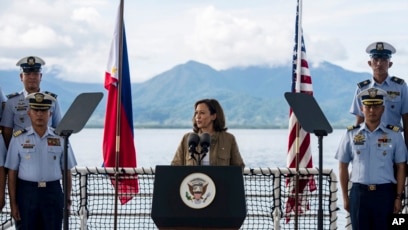Puerto Princesa, Philippines
THE VICE PRESIDENT: Good afternoon, everyone. Good afternoon. Thank you, Mr. Undersecretary, for the warm welcome. It is truly great to be here with all of you — local elected officials, distinguished guests, and community leaders. And it is an honor to be with members of the Philippine Coast Guard.
The United States is proud of our longstanding ties with the people of the Philippines. I am here in Palawan to underscore the importance of our partnership in order to create economic opportunities, protect coastal ecosystems, maintain peace and stability, and uphold international rules and norms here in the South China Sea and around the world.
To uphold international rules and norms is to support the lives and the livelihoods of people throughout the region.
Earlier today, I heard from local officials in Tagburos about the generations of families that have fished these waters.
The fisheries of Palawan not only provide food for residents, but serve as the economic lifeblood of this island.
I met fishers who go out every day and sustainably catch mackerel and tuna. I spoke with a young woman — her name is Jacqueline — who runs a fish-drying business, a business that has been so successful that she has taught other women how to dry rabbitfish so that they can too participate in a vital industry and benefit from extra income.
Community leaders are also working to help residents adapt to warming waters and extreme weather.
The stories I have heard make clear this community has come together to sustainably manage natural resources.
Despite many challenges, I saw the strength and the resilience of the Palawan community.
However, the vitality of communities like this is at risk. Communities like this have seen the consequences, and people here know the impacts, when foreign vessels enter Philippine waters and illegally deplete the fishing stock; when they harass and intimidate local fishers; when they pollute the ocean and destroy the marine ecosystem.
Illegal, unreported, and unregulated fishing — also called IUU — is far too common across the world’s oceans. It presents a direct threat to coastal ecosystems and economies
To help address these maritime issues, the United States is proud to have a strong partnership with the Philippines, which includes the training recently conducted on this very ship with the Philippine Coast Guard and U.S. service members.
And today I am pleased to announce additional areas of cooperation.
The United States will provide new funding to Philippine maritime law enforcement agencies to increase their capacity to counter IUU fishing, to enhance monitoring systems, and to upgrade equipment.
This will all build upon new initiatives I launched in May at the U.S.-ASEAN Special Summit in Washington, D.C., to provide more training, assets, and personnel to build maritime law enforcement capabilities across Southeast Asia.
In addition, we have increased efforts to provide countries in the region with a wider and more accurate picture of their territorial waters.
In May, in Tokyo, alongside the leaders of Australia, Japan, and India, President Joe Biden launched the Indo-Pacific Partnership for Maritime Domain Awareness. This initiative uses space-based platforms to deliver a common operating picture of Indo-Pacific waterways and to promote transparency so that our allies and partners can better protect vulnerable fisheries, respond to humanitarian disasters, and detect and counter illicit activities.
I am pleased to report that the Philippines is already receiving this stream of data alongside other partners here in Southeast Asia. And we plan to increase this work in the coming months to include launching new satellites into orbit in December to expand this program.
Through USAID, we are also launching a new partnership with local communities here in Palawan to promote sustainable fishing, strengthen food security, and conserve marine ecosystems.
So this is how I see it: To protect the economic vitality of these communities, to protect the ecosystems they rely on, and to protect lives and livelihoods, we must uphold international rules and norms. And that is why our work here is so very important.
We must stand up for principles such as respect for sovereignty and territorial integrity, unimpeded lawful commerce, the peaceful resolution of disputes, and the freedom of navigation and overflight in the South China Sea and throughout the Indo-Pacific.
To the Philippine Coast Guard, you are on the frontlines of standing up for the international rules-based order.
Each and every day, as you patrol these waters, you uphold the rules and norms that are vital to the prosperity of the Filipino people and people around the world.
The United States and the broader international community have a profound stake in the future of this region. America’s prosperity relies on the billions of dollars that flow through these waters every day. And we are proud to work with you in your mission.
As an ally, the United States stands with the Philippines in the face of intimidation and coercion in the South China Sea.
As the United States has long made clear, we support the 2016 ruling of the U.N. arbitral tribunal, which delivered a unanimous and final decision firmly rejecting China’s expansive South China Sea maritime claims. The tribunal’s decision is legally binding and must be respected.
We will continue to rally our allies and partners against unlawful and irresponsible behavior.
When the international rules-based order is threatened somewhere, it is threatened everywhere.
So the rules and norms that I have discussed today, they matter to the United States, to the Philippines, and to communities around the world.
So to all of you here today, I say: The United States-Philippines alliance is strong. We are committed to you. We are committed to your success and to all the lives and livelihoods that rely on your work.
Thank you. (Applause.)
END
The post Remarks by Vice President Harris Aboard the Philippine Coast Guard Ship Teresa<span class=”dewidow”> </span>Magbanua appeared first on The White House.


